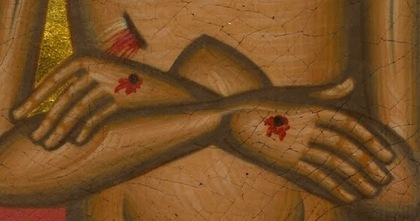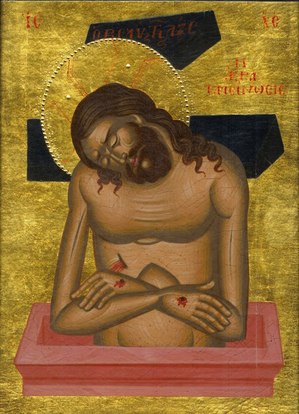What are these wounds in thine hands?

Votive Mass of the Passion of Our Lord Jesus Christ
Yesterday (Friday) morning we had the Votive Mass of the Passion of Our Lord Jesus Christ (Humiliavit). It is, to my mind, one of the most beautiful Votive Masses in the Roman Missal. The Collect is addressed directly to Our Lord Jesus Christ.
Collect
O Lord Jesus Christ, who didst descend from heaven to earth from the bosom of the Father, and hast poured out thy Precious Blood for the remission of our sins: we humbly beseech thee; that at the last day we may be found acceptable in thy sight, and receive thy gracious invitation: Come ye blessed of my Father.
God Descends
The little phrase who didst descend from heaven to earth recalls the words that God, speaking out of the burning bush, addressed to Moses.
And knowing their sorrow, I am come down to deliver them. (Exodus 3:8)
God comes down. The fulfillment of this descent is, of course, the Incarnation of the Son of God. He descends from heaven into the Virgin’s womb. He descends into the manger at Bethlehem. He descends into Egypt as a refugee child whose very life is threatened. He descends to Nazareth. He descends into the ordinary life of every child of Adam, and so knows hunger, thirst, weariness, sorrow, tears, loneliness, and fear. He descends into the humiliations of His bitter Passion. He descends into death. He descends into the tomb. He descends into Hades.

In the Most Holy Sacrament
Even ascended into glory where He is enthroned at the right hand of the Father, He descends day after day to the altars of His Church, where, lest we forget the mystery of His coming down, He hides Himself beneath the appearance of a fragile piece of bread. The Most Holy Eucharist is the mystery of the humility of God, the humility of God who comes down to the point of pouring Himself out utterly. This is what Mother Mectilde de Bar calls the anéantissement of the Son of God in the adorable Sacrament of the Altar: the mystery of the All-Powerful God descending so low as to assume the appearance of bread. For love of us, sinners, and because that love compels Him to remain with us, and to nourish us with His own Body and Blood, He hides Himself and remains silent in the Most Holy Sacrament.
Lesson: Zacharias 12:10-11; 13:6-7
Thus said the Lord: I will pour upon the house of David, and upon the inhabitants of Jerusalem, the spirit of grace and of supplications: and they shall look upon me whom they have pierced, and they shall mourn for him, as one mourneth for his only son, and shall be in bitterness for him, as one that is in bitterness for his firstborn. In that day shall there be a great mourning in Jerusalem. And one shall say unto him, What are these wounds in thine hands? Then he shall answer, Those with which I was wounded in the house of my friends. Awake, O sword, against my shepherd, and against the man that is my fellow, saith the Lord of hosts: smite the shepherd, and the sheep shall be scattered, saith the Lord Almighty.
The Holy Spirit
The Spirit of grace and supplications is none other than Holy Spirit, apart from whom, according to the teaching of Saint Paul, no one can say, Jesus is Lord. (1 Corinthians 12:3) The Spirit of grace and supplications, says the Apostle,
. . . helpeth our infirmity. For we know not what we should pray for as we ought; but the Spirit himself asketh for us with unspeakable groanings. And he that searcheth the hearts, knoweth what the Spirit desireth; because he asketh for the saints according to God. (Romans 8: 26-27)
Adoration and Reparation
It is, then, the Holy Spirit — transmitted to the Church on Calvary in the breath of Jesus Crucified, and flowing out His pierced side — who compels some souls in every generation to abide before the Son of God, humble, hidden, and silent in the Host, in profound adoration and reparation. “They shall look upon me whom they have pierced,” says the Lord. The Holy Spirit directs the gaze of the soul to the One who, in glory and in the Sacrament of His Love, remains the Pierced One. One cannot gaze upon the Pierced One, the immolated Lamb, the Victim of the Altar, without experiencing the sweet bitterness of compunction and reparation.
A Great and Sorrowful Mystery
Seeing the fairest of the children of men, the Only-Begotten Son, wounded in His Heart, His feet, and His hands, one is compelled to ask, “What are these wounds in thine hands?” The wounds in the hands of Christ — His hands raised in prayer, His hands extended in blessing, His hands baptizing those darkened by sin, His hands nourishing souls with the Bread of Angels, His hands anointing the sick — these wounded hands signify His priesthood. “Then he shall answer, Those with which I was wounded in the house of my friends.” (Zacharias 13:6). This is a great and sorrowful mystery: Christ’s hands wounded in the house of His friends.
I Have Called You Friends
What did Our Lord say to His apostles, to His first priests, on the night before He suffered? “I will not now call you servants: for the servant knoweth not what his lord doth. But I have called you friends.” (John 15:15) Before doing anything at all — even before preaching the Word of God and dispensing His grace in the Holy Mysteries — priests are called to be the friends of Jesus — not mere acquaintances, nor business associates — but friends. The house of the friends of Jesus is the Church. It is in the Church that Jesus is wounded in His hands: wounded in His priests, and wounded by His priests. Joseph Cardinal Ratzinger spoke prophetically of this in 2005 in his meditation on the ninth Station of the Way of the Cross:
Should we not also think of how much Christ suffers in his own Church? How often is the holy sacrament of His Presence abused, how often must he enter empty and evil hearts!How often do we celebrate only ourselves, without even realizing that he is there! How often is his Word twisted and misused! What little faith is present behind so many theories, so many empty words! How much filth there is in the Church, and even among those who, in the Priesthood, ought to belong entirely to him! How much pride, how much self-complacency!
Adoration and Reparation
Yes, Christ suffers in His own Church; He is wounded in His hands, and this in the house of His friends. To souls who grieve over the suffering of Christ in His own Church, the Holy Spirit proposes the only fitting response: adoration and reparation. Adoration allows us to kiss the wounded hands of Christ; reparation allows us to press them against our own wounds and against the wounds of all His priests. “He was wounded for our iniquities, He was bruised for our sins: the chastisement of our peace was upon him, and by His bruises we are healed.” (Isaiah 53:5)

Thank you, Father.
I’ve often wondered if there is any devotion/meditation/prayer, etc., focusing on our Lord’s hands? There’s so much grief and blessedness when one begins to think about them.